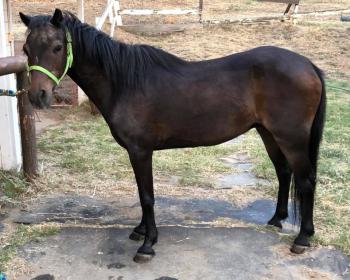We adopted a small 24yro shetland gelding this past May. He came to us in some need of groceries, sheath cleaning, vet visits, and serious grooming, but he’s turned around nicely. The puzzling thing is, he continues to quid his hay to a ridiculous extent despite the float.
The vet came out twice in the first month we had him; first time was for exam, shots, and the like; second time was for anything requiring sedation as at the first visit, it was too hot for her to feel comfortable doing that with an older underweight pony. She assumed he must have bad teeth in the back (previous owner had his teeth floated about 6mos before, but the guy who did it doesn’t sedate so likely didn’t get in to the back teeth), so when she returned he was sedated and given a thorough dental exam with a speculum. He had some need for a float in back, but nothing severe–no ulcers, no loose teeth, no rotting teeth, nothing. In fact, his teeth were in some ways better than our 20yro mini mare’s–and she’s had regular dental care her whole 15 years with us. The vet thought maybe the little bit of floating she did might be enough to end the quidding and said to give it a few weeks, but alas, he’s quidding as much if not more than ever.
The vet is vexed and so are we. He doesn’t seem painful when eating, just ridiculously sloppy. The majority of his feed is pellets and low starch senior feed to make sure he’s getting the calories he needs, but we still give him hay as he likes to graze–despite all the spitting out.
Any ideas on what else we could be checking for?
Some other background info: 1) He has a fly allergy, so his eyes are often weepy. The vet flushed his ducts and we used a prescription steroid to help with swelling, but it seems the main thing he needs is a fly mask and for fly season to just be over already. 2) He has a cataract forming in his left eye. 3) He has some sort of skin condition (likely due to flies again I’m guessing) that makes him have a crazy amount of dander. Baths and regular grooming have made it 80% better, though.

 And would love to see a picture (that is an actual rule you know - when you talk about your pony, we have to see a picture of him/her).
And would love to see a picture (that is an actual rule you know - when you talk about your pony, we have to see a picture of him/her). 
 This is after a couple months of baths, grooming, groceries, foot care, etc.
This is after a couple months of baths, grooming, groceries, foot care, etc.